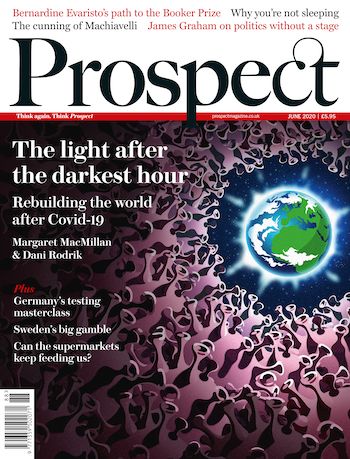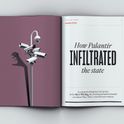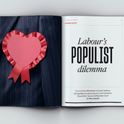
______________________________________________________
A brilliant and encouraging essay by MacMillan. International co-operation is indeed essential. MacMillan’s Canada and Britain have a long tradition of mutual support. My hero, the great Lord Haldane, gave his brilliant speech as lord chancellor on the subject of a “higher nationality” in Montreal in 1913. He went on to be the first minister to place a paper on the concept of a post-war league of nations before the cabinet in 1915. Today, true statesmanship is rare. The crisis creates opportunities. If we grasp them, great things can be done—and great things done endure. John Campbell, via the website WHO is culpable? As Ngaire Woods specifically mentions me (in the embarrassing company of Donald Trump) as a critic of the WHO, I should say I agree with a lot of her defence of the organisation (“Who is the WHO?” June). I have expressed my opposition to Trump’s intention to remove funding and recognise the essential work it is now doing. It is of course difficult to run an international organisation when China and the US, the two largest members, are such awkward customers. Nor should the WHO’s failings excuse the US and UK governments from their own. But it is not good enough to say the WHO should be forgiven for passing on Beijing’s reassurances or ignoring Taiwan’s concerns because it needed China’s co-operation. It had a responsibility to warn that the evidence of human-to-human transmission was compelling and should be acted upon. If the WHO had done that, all later co-operation with China might not have been so necessary. Moreover, Beijing has an increasing tendency to bully anybody (individuals, companies, international organisations) who doesn’t go along with its narrative. If this continues to be tolerated then international co-operation on all sorts of issues will soon become impossible. Lawrence Freedman, King’s College London More banknotes The debate between Adair Turner and Paul Tucker is fascinating (“The Duel,” May). And it raises a fundamental issue: can/should central banks take credit risk? And if so, how much? In what used to be “normal times,’’ when interest rates were higher and there was room to decrease them, the rule was a clear “no”: the central bank moved the policy rate and let all other rates adjust freely. With the policy rate now so low, is it OK for the central bank to buy a range of assets in a way that reduces this spread, even if the spread reflects the worries of investors about the possibility of default? To be concrete: would it be OK if the European Central Bank fully eliminated the spread on Italian bonds? Why or why not? These are difficult questions—but we must seek to answer them. Olivier Blanchard, former chief economist, IMFNationalism never works One wonders how Anatol Lieven’s ideas will stand up in a post Covid-19 world, where the lesson we have learned, more than any other, is how interconnected we are (“The nation and the planet,” May). To date the response of most ordinary people has been not to look inwards, but outwards. They have come together in myriad ways to care for one another, within and across borders. Climate justice demands that we extend this same solidarity to all those most impacted by the climate crisis. Yes, governments are critical to this but if they, as Lieven suggests, appeal to nationalism, that will lead directly to “my country first.” Self-interested nationalism has not served countries like the US well in this pandemic. It won’t in tackling the climate crisis either. Caroline Lucas, Green MP for Brighton PavilionThe life you can save Peter Singer suggests that when rationing life-saving resources, younger patients should be prioritised over older ones because they are expected to live longer after we help them (“The Duel,” June). This justification, which maximises years of life from the life-saving point onward, differs from a possible rationing alternative based on a fair distribution of total years of life. That is, fairness between morally equal people could mean giving some priority to providing additional years of life to the person who will have had the fewest years if he dies (on this policy, those who are older now would have benefited if it had been applied when they were young). This could imply saving a 30-year-old who would live another 10 years rather than a 60-year-old who would live another 20 years. Both fairness and maximising outcome approaches must explain whether infants should be favoured over 30-year-olds for reasons like those outlined above, or whether there are additional factors to consider. Frances Kamm, philosopher Stay alert David Allen Green is right to highlight the extraordinary powers given to the executive by the regulations made on 26th March (“Criminalising ordinary life,” June). As I have previously said, the statutory basis for the unhappily drafted regulations was uncertain. Parliament should have quickly reviewed the package and put it on sound footing. That view (albeit reached by a different route) was shared by Stephen Laws (past first parliamentary counsel), writing for Policy Exchange. However, it would have helped to explain that the regulations were to lapse unless there was an affirmative resolution within 28 sitting days. Indeed, on 12th May, the first substantial relaxations were introduced. It is not the government’s wish, it seems, that it rule by executive fiat. But we must all remain alert and questioning. Guy Sandhurst, former Bar Council chairmanCrowns and hounds In your history of meetings with the great and good (“The way we were,” June) Samuel Pepys describes riding in a barge with Charles II and his son, and discovering that “the more a man considers and observes them, the less he finds of difference between them and other men.” It wasn’t the first time he’d found himself in a boat, forced to notice the king’s feet of clay. Five years earlier, when Charles returned from exile to claim the English throne, the triumphant party came ashore in two landing crafts. The king was in one. In the other was Pepys, babysitting Charles’s over-excited lapdog. “I went… with a dog that the King loved, (which dirted the boat, which made us laugh, and me think that a King and all that belong to him are but just as others are.)” John Phipps, North YorkshireFree to sleep badly Finally, an article that lets us strike an item off the tyrannical, ever-lengthening list of things at which we must try harder. Barbara Speed’s sane investigation into our self-defeating obsession with slumber (“In search of sleep,” July) shows how the pursuit of the magical—and not altogether scientific—eight hours a night has spawned an industry extending far beyond overpriced mattresses, with publishers, app developers and candlemakers all scrambling to cash in. Far better than offering a cure of her own—most of which, she says, are only temporary—Speed gives us permission to sleep badly. What kind of a person would you be if you weren’t tossing and turning in 2020? Hephzibah Anderson, Prospect columnistClarking error For the last two editions, each offering on your letters pages has taken two or three lines of bold type to evidence the qualification of the writer to dare to communicate with you. Previous editions had a better ratio of “ordinary” people. For the record I have been variously a bank clerk, a transport manager, a prison inmate and now a jobbing gardener. I fear these may all be disqualifications. But Tom, there is a word missing from the ninth line of the penultimate paragraph in your June editorial! John Maybery, Devon












